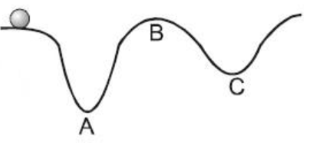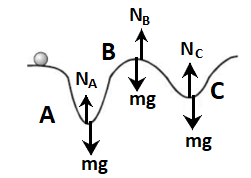Question
Question: A body moves along an uneven surface with constant speed at all points. The normal reaction of the r...
A body moves along an uneven surface with constant speed at all points. The normal reaction of the road on the body is:

A) maximum at A
B) maximum at B
C) minimum at C
D) the same at A, B & C
Solution
For any question type where the normal reaction of the body is asked then start the question by making FBD (free body diagram) as it facilitates the further solution in a smooth manner.
Complete step by step solution:
Free body diagram is given as

Let us consider that the body is moving with constant velocity v.
For A:
The body exerts a force (action) equal to the weight W=mg on the surface. The surface exerts a reaction NA on the body in equal direction.
Here, the centripetal force (FC = RAmv2) is in upward direction.
Net force is given by
NA - mg = RAmv2 ⇒NA = RAmv2 + mg...(i)
Where NA= Normal reaction
For B:
The body exerts a force (action) equal to the weight W=mg on the surface. The surface exerts a reaction NB on the body in equal direction.
Here, the centripetal force (FC = RBmv2) is in downward direction.
Net force is given by
mg - NB = RBmv2 ⇒NB = mg - RBmv2...(ii)
For C:
The body exerts a force (action) equal to the weight W=mg on the surface. The surface exerts a reaction NC on the body in an equal direction.
Here, the centripetal force (FC = RCmv2) is in downward direction.
Net force is given by
NC - mg = RCmv2 ⇒NC = mg + RCmv2...(iii)
Since radius of A < radius of C i.e. RA < RC (from the given figure)
From (i), (ii) and (iii) we get
NA is maximum.
Thus, the normal reaction of the road on the body is maximum at A.
Therefore, option (A) is the correct choice.
Note: Action and reaction are equal in magnitude, opposite in direction and the most important point is that both the forces i.e. (action and reaction) act on different bodies not on the same body.
